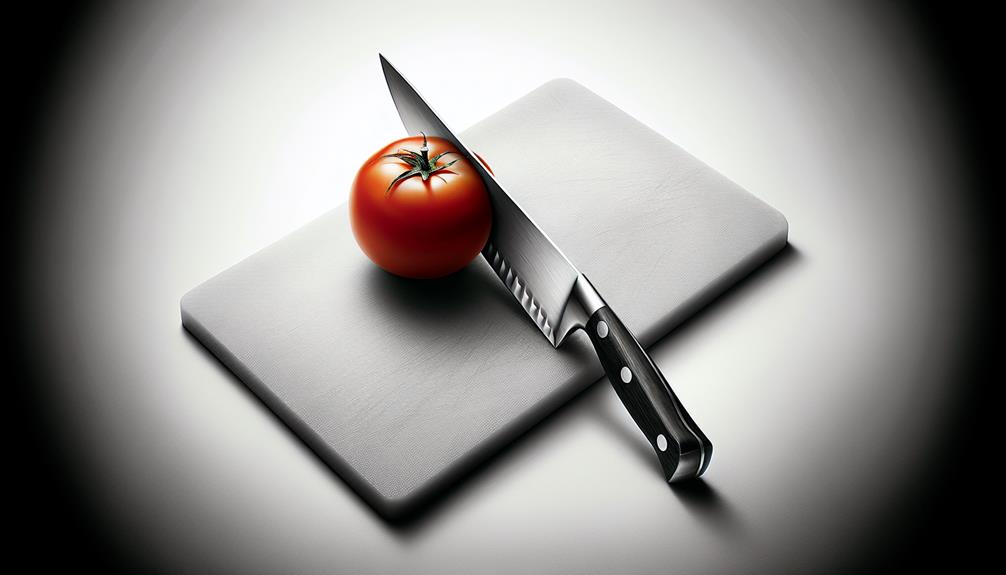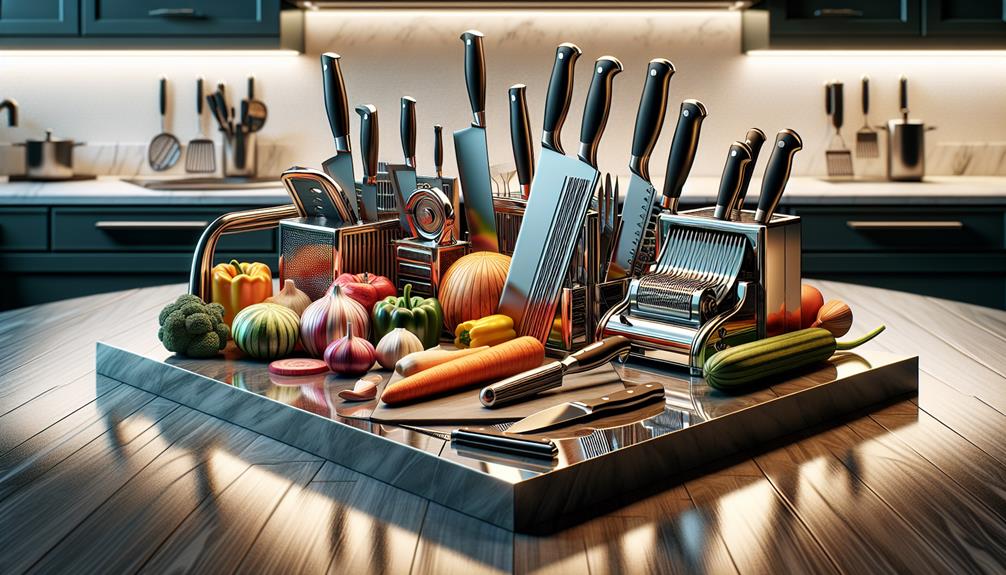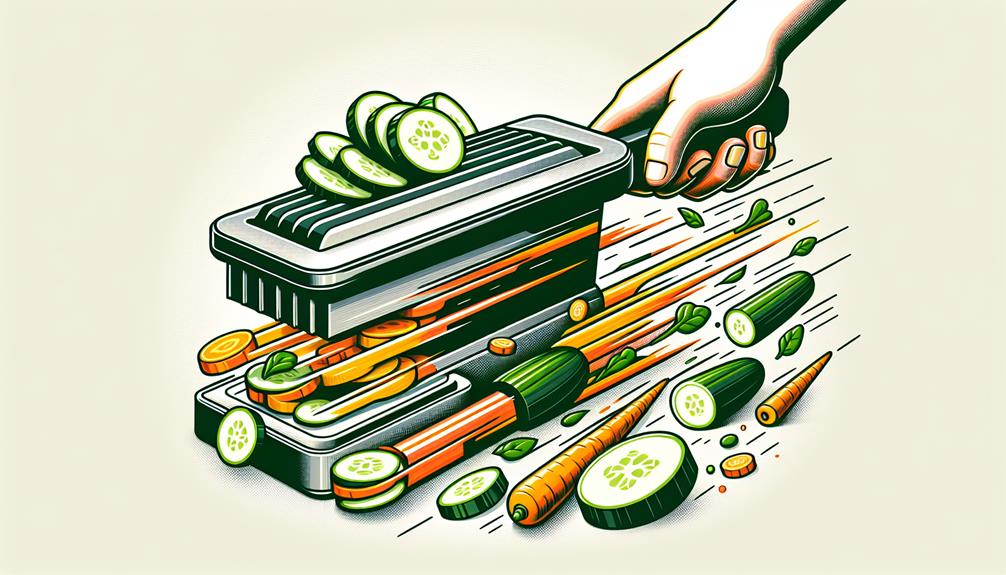When it comes to selecting the perfect high-precision chef knives, you're not just buying a tool – you're investing in your culinary craft. You know that a great knife can make all the difference in the kitchen, but with so many options out there, how do you choose the right one? It starts with understanding your cutting needs and priorities. What type of cooking do you do most often? Are you looking for a knife that can handle heavy-duty chopping or precise slicing? Answering these questions will lead you down a path of discovery, and we're about to uncover the essential factors to weigh when choosing your next go-to knife.
Understand Your Cutting Needs
You likely have a specific set of cutting tasks in mind when shopping for high-precision chef knives, whether it's chopping vegetables, slicing meat, or dicing fruit for a recipe. To find the perfect knives, you must understand your cutting needs. Think about your culinary style: do you specialize in precise Japanese cuts or hearty American chops? Consider your personal preference: do you prefer a light, agile knife or a heavier, more substantial one?
Reflect on the specific tasks you'll be using your knives for most often. If you're a vegetarian, you might prioritize a knife with a sharp, curved edge for slicing through tough vegetables. Meat enthusiasts, on the other hand, might opt for a straight-edged knife for precise cuts. Even the type of recipes you cook can influence your choice: delicate pastry work requires a different knife than heavy-duty butchery.
Material Matters Most
When it comes to high-precision chef knives, you're not just looking for a sharp blade – you're looking for a durable one that'll withstand the rigors of your kitchen. That's why the material matters most, and you'll want to weigh the type of steel used in the blade's construction. You'll need to decide between steel type options and understand the importance of blade composition to guarantee you get a knife that'll last.
Steel Type Options
High-carbon stainless steel, Damascus steel, and ceramic blades are the primary steel type options that substantially impact the performance, durability, and maintenance of your chef knives. When choosing, you'll want to weigh the benefits of each. Forged high-carbon stainless steel knives offer exceptional strength, rust resistance, and edge retention. They're also more durable and less prone to corrosion. Forged benefits include a stronger blade that can withstand heavy use and maintain its sharpness.
Stainless varieties, like 420J1 and 420J2, are resistant to corrosion and easy to maintain. They're a great choice for busy kitchens where knives are frequently exposed to moisture and acidic foods. Damascus steel, on the other hand, is prized for its unique pattern and exceptional sharpness. It's a high-carbon steel alloy that's strong, yet flexible, and resistant to corrosion. Ceramic blades are lightweight, rust-free, and easy to sharpen. They're ideal for delicate tasks and require minimal maintenance. By understanding the characteristics of each steel type, you'll be able to select the best knives for your cooking needs and preferences.
Blade Composition Importance
Selecting the right blade composition is critical, as it directly impacts the knife's performance, durability, and maintenance requirements. You'll want to weigh the pros and cons of each material to find the best fit for your cooking style.
Ceramic blades, for instance, offer several benefits. They're incredibly sharp, resistant to corrosion, and require minimal maintenance. Plus, they're often lighter and more ergonomic than their steel counterparts. However, they can be brittle and prone to chipping, making them less durable than other options.
On the other hand, high-carbon steel blades boast exceptional strength, durability, and edge retention. They can be sharpened to a razor-sharp edge and maintain it well. Some high-end options even feature Damascus patterns, which not only add visual appeal but also increase the blade's strength and flexibility. When choosing a steel blade, look for high-carbon content (at least 0.5%) for peak performance. Ultimately, the right blade composition depends on your personal preferences, cooking style, and maintenance habits. By understanding the benefits and drawbacks of each material, you'll be able to select a high-precision chef knife that meets your unique needs.
Edge Retention Is Key
You need a chef knife that can hold its edge through repeated use and cleaning, as a dull blade can quickly become a hindrance in the kitchen. A high-precision chef knife should be able to maintain its sharpness, even with daily use and regular cleaning. This is where edge retention comes in – the ability of the blade to resist wear and tear. A good chef knife should be able to go for a while before needing to be sharpened. Sharpening frequency is a vital consideration, as you don't want to be sharpening your knife every day. Look for a knife with a blade geometry that allows for a sharp, precise edge. A well-designed blade will require less maintenance and will perform better over time. When choosing a chef knife, consider the type of steel used, the heat treatment process, and the sharpening angle. These factors will all impact the knife's edge retention, making it easier for you to cook with precision and confidence.
Balance and Ergonomics Count
Handling a well-balanced chef knife feels like an extension of your hand, allowing you to chop, slice, and dice with precision and control. When you hold a knife that's ergonomically designed, you'll notice how naturally it fits in your hand, reducing fatigue and strain. This is especially important if you have specific grip styles or comfort zones. A well-balanced knife will adapt to your unique grip, making it easier to maneuver and manipulate. Look for knives with contoured handles that fit snugly in your palm, providing a secure grip even when your hands are wet or oily. The weight of the knife should be evenly distributed between the blade and handle, allowing you to make precise cuts with minimal effort. By choosing a knife that's tailored to your grip style and comfort zone, you'll be able to work more efficiently, accurately, and safely in the kitchen. A high-precision chef knife that feels like an extension of your hand is an investment in your culinary skills and overall cooking experience.
Sharpness Out of the Box
Fresh out of the box, a high-precision chef knife should slice through ingredients with ease, its sharpness evident from the first cut. You shouldn't need to spend hours honing the blade before it's ready for use. Look for knives that have undergone factory sharpening, which guarantees a razor-sharp edge from the get-go. This process involves precision machinery that sharpens the blade to an exact angle, resulting in a consistently sharp edge.
However, even with factory sharpening, maintaining your knife's edge through regular hand honing is crucial. This process realigns the blade's teeth, keeping it sharp and preventing it from becoming dull. When choosing a high-precision chef knife, consider the type of steel used, as some are more receptive to hand honing than others. A knife that's easy to hone will save you time and effort in the long run. By prioritizing sharpness out of the box and considering the need for hand honing, you'll be able to find a knife that stays sharp and performs exceptionally well in the kitchen.
Durability and Rust Resistance
When considering the durability and rust resistance of a high-precision chef knife, you'll want to examine the metal composition and any coatings or treatments applied. These factors will notably impact how well your knife withstands the rigors of daily use and resists corrosion. By looking closely at these aspects, you'll be able to choose a knife that will remain a trusted companion in the kitchen for years to come.
Metal Composition Matters
By selecting a chef knife with the right metal composition, you guarantee a durable and rust-resistant tool that will withstand the rigors of daily kitchen use. The molecular structure of the metal plays a vital role in determining its performance. Look for knives made from high-carbon stainless steel, which offers an excellent balance between hardness and corrosion resistance. This type of steel contains a higher percentage of carbon, which creates a stronger molecular bond, making it more resistant to corrosion and wear.
Thermal conductivity is another important factor to think about. A good chef knife should be able to dissipate heat quickly, preventing it from becoming too hot to handle. Metals with high thermal conductivity, such as copper or silver, are ideal for this purpose. However, they can be expensive and may not be necessary for a high-precision chef knife. Instead, look for knives with a stainless steel or chromium content, which provide a good balance between durability and thermal conductivity. By choosing a knife with the right metal composition, you'll provide a reliable and efficient cutting experience that will last for years to come.
Coatings and Treatments
You can further enhance the durability and rust resistance of your high-precision chef knife by considering the coatings and treatments applied to the metal composition. These coatings and treatments not only protect the knife from corrosion but also improve its performance and ease of use. Non-stick coatings, for instance, prevent food from sticking to the blade, making it easier to slice and dice ingredients. This coating also reduces the risk of food residue building up, which can lead to rust and corrosion.
Ceramic plating is another popular treatment that provides an additional layer of protection against rust and corrosion. This plating creates a hard, non-reactive surface that prevents acidic foods from reacting with the metal, reducing the risk of discoloration and corrosion. When choosing a high-precision chef knife, look for coatings and treatments that are specifically designed to enhance durability and rust resistance. By doing so, you'll be able to enjoy a longer-lasting, high-performance knife that continues to deliver exceptional results in the kitchen.
Brand Reputation and Warranty
A reputable brand's commitment to quality and customer satisfaction is often reflected in its warranty, which can give you peace of mind and protect your investment. When researching brands, look for ones that stand behind their products with an extensive warranty. This can include coverage for defects, sharpening, and even replacement. A good warranty can also increase the resale value of your knives, making them a more valuable investment.
You can also gauge a brand's reputation by reading customer reviews. Look for reviews that mention the brand's customer service, warranty, and overall quality. If you notice a pattern of positive reviews and satisfied customers, it's likely a brand that's committed to quality and customer satisfaction. Additionally, check if the brand is a member of any reputable industry associations or has received any notable awards. By doing your research and choosing a reputable brand, you can trust that your high-precision chef knives will meet your expectations and last for years to come.
Frequently Asked Questions
Can I Sharpen My Chef Knives With an Electric Sharpener?
You can sharpen your chef knives with an electric sharpener, but be cautious of the type; diamond-coated wheels can be too aggressive, while ceramic or stone wheels are gentler, requiring precise sharpening techniques for ideal results.
How Do I Store My Knives to Prevent Damage?
You'll want to store your knives safely to prevent damage. Consider using knife rolls or drawer organizers to keep them separate and protected. This will prevent scratching and tangling, and keep your blades in top condition.
Are High-Carbon Stainless Steel Knives Worth the Extra Cost?
You're wondering if high-carbon stainless steel knives are worth the extra cost. Honestly, they're a game-changer – their superior steel quality guarantees exceptional edge retention, making them a worthwhile investment for your cooking routine.
Can I Put My Chef Knives in the Dishwasher?
You shouldn't put your chef knives in the dishwasher, as the high heat and harsh detergents can damage the blade's edge and compromise dishwasher safety. Instead, opt for gentle cleaning methods like hand washing and drying.
Do I Need to Oil My Chef Knives Regularly?
You should oil your chef knives regularly to prevent rust and promote smooth blade maintenance. Failing to do so can lead to knives rusting, making them dull and difficult to clean.
Conclusion
You've considered your cutting needs, material, edge retention, balance, sharpness, durability, and brand reputation. Now, you're equipped to choose a high-precision chef knife that meets your unique demands. Remember, a great knife is an investment in your craft, and the right one will elevate your cooking experience. By prioritizing your needs, you'll find a knife that becomes an extension of your hand, helping you create culinary masterpieces with ease and precision. Take the time to test different options, ensuring the knife feels comfortable and responsive in your grip. With countless highprecision knives for chefs available on the market, finding the perfect fit is all about aligning functionality with personal preference. Ultimately, the right choice will not only enhance your efficiency in the kitchen but also inspire confidence as you take on even the most intricate culinary challenges.





